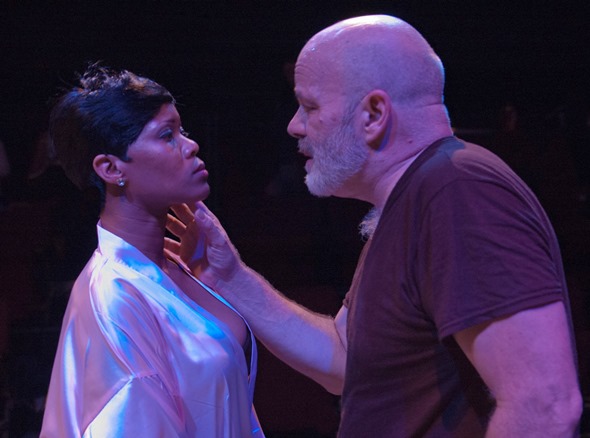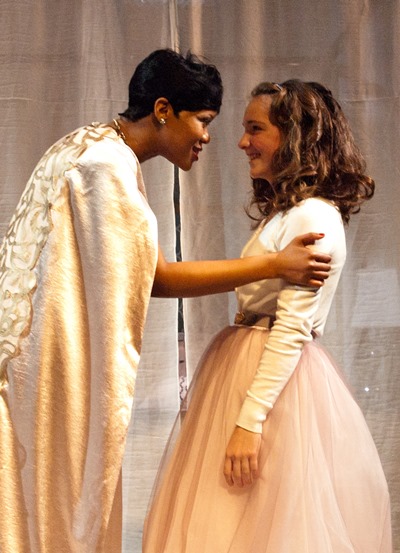‘The Last Wife’ at TimeLine: She is Henry’s sixth queen, playing perilous game of survival
 Review: “The Last Wife” by Kate Hennig, U.S. premiere at TimeLine Theatre through Dec. 18. ★★★★★
Review: “The Last Wife” by Kate Hennig, U.S. premiere at TimeLine Theatre through Dec. 18. ★★★★★
By Lawrence B. Johnson
If you’d care to see what absolute power wielded by a single individual looks like, and what a scary thing that is, look no further than Steve Pickering’s iron-fisted incarnation of Henry VIII in the U.S. premiere of Kate Hennig’s “The Last Wife” at TimeLine Theatre.
And in the same frame, so to speak, behold the precarious life of the title character, Katherine Parr, a brilliant woman (played to her full measure by AnJi White) who matches the king in wit, imagination and perhaps even ambition, only to be reminded in the most terrifying terms that Henry is ruler absolute: not a teammate but the living Word of the English realm, his authority surpassed by God alone, and fierce guardian of that station.
 Hennig’s dazzling play, supremely acted under the regal hand of director Nick Bowling, proposes an intimate glimpse of life in the king’s inner sanctum. It is a theatrical experience not to be missed.
Hennig’s dazzling play, supremely acted under the regal hand of director Nick Bowling, proposes an intimate glimpse of life in the king’s inner sanctum. It is a theatrical experience not to be missed.
Yet it all begins with unprepossessing casualness. A couple comes through the door at one end of this alley stage layout. They’re in modern dress (designed by Melissa Torchia). He’s coming on to her, but she’s sort of resisting. This is nothing more than a cocktail party gambit, the banter superficial, pedestrian, tedious. Then the door opens again and a barrel-chested man, well, barrels in. He’s fiftyish, a bit gimpy, but self-possessed and unceremonious. This is Henry VIII, King of England, and the tone of the play is about to take a sharp and permanent change.
The striking, statuesque woman is Katherine Parr, wife of an aristocrat widely known to be in poor health; the young man is Thomas Seymour (Nate Santana), one of Henry’s courtiers. They are indeed lovers, and Henry either knows it or strongly suspects as much. A clear-sighted judge of character, the king displays a seemingly prescient sense of the intentions of others. Nothing gets past him. And as he has decided to marry Parr – once her failing husband is out of the way – he dispatches Seymour to Holland to look after English interests there and to report back, oh, quarterly.
 What follows might be characterized as a royal mating dance, its music resonant in the bracing, buoyant language – several languages, actually – of the resolved king and the woman who ventures to set terms before a man who ordinarily might not accede to any stipulations at all. But Henry does accede, even agreeing to call her by the name she requires, Parr. In his concessions we witness the setting of the foundation of a marriage that might even honor that concept – and last longer than the notorious wife-slayer’s first five.
What follows might be characterized as a royal mating dance, its music resonant in the bracing, buoyant language – several languages, actually – of the resolved king and the woman who ventures to set terms before a man who ordinarily might not accede to any stipulations at all. But Henry does accede, even agreeing to call her by the name she requires, Parr. In his concessions we witness the setting of the foundation of a marriage that might even honor that concept – and last longer than the notorious wife-slayer’s first five.
Parr’s husband dies, and as Pickering’s stormy, willful, unpredictable king adjusts to sharing space with his new queen, her natural elegance, intelligence and wide-ranging education win him over so completely that he entrusts her with the mentoring of his three children by previous wives – Edward (called Eddie), the heir apparent, born to Jane Seymour; Mary, daughter to Catherine of Aragon, and Elizabeth (called Bess), child of Anne Boleyn and destined to become Elizabeth I.
 Paola Sanchez Abreu’s smartly focused portrayal of Mary as distant, headstrong and petulant captures the alienation of this child of Catholic Spain from the domineering Henry and his self-proclaimed Protestant Church of England. Mary, 17 years older than Bess, is a full-grown woman, and thus Abreu is a fixture of the cast. Alternating as the adolescent Bess are Peyton Shaffer and Caroline Heffernan, whom I saw in a performance that was nothing short of luminous. Switching off as the still-younger Eddie are Matthew Abraham and Chinguun Sergelen, whose charming boy-prince I caught.
Paola Sanchez Abreu’s smartly focused portrayal of Mary as distant, headstrong and petulant captures the alienation of this child of Catholic Spain from the domineering Henry and his self-proclaimed Protestant Church of England. Mary, 17 years older than Bess, is a full-grown woman, and thus Abreu is a fixture of the cast. Alternating as the adolescent Bess are Peyton Shaffer and Caroline Heffernan, whom I saw in a performance that was nothing short of luminous. Switching off as the still-younger Eddie are Matthew Abraham and Chinguun Sergelen, whose charming boy-prince I caught.
The play isn’t called “The Last Wife” for nothing. Fascinating, and indeed daunting, as Pickering’s Henry may be, it is White’s magisterial Parr who commands our attention and empathy as she manages the household both upward (the king) and downward (the kids). White is disarming: composed, articulate, authoritative. Where Parr’s better interests are concerned, one might say authoritative to a fault. Unwittingly, forgetting exactly who it is now sharing her bed and breakfast, Parr oversteps herself.
When Henry, an admittedly inept soldier, sojourns to France to play at war, Parr talks him into allowing her to serve as protector of the realm in his absence. She’s an astute surrogate, even helping him to prevail in France. He commends her upon his return and even indulges the proclamations she has made in his absence. Parr is exhilarated. It feels so good, she tells him, to use her brain. The two of them, she declares, will make a great team. Oops.
Henry isn’t exactly a team player, and he instantly dumps the wind from Parr’s sails. Her exuberant proposition draws immediate charges of sedition and treason. Henry isn’t kidding. Just like that, Parr’s life is forfeit. The rest is a historical cliff-hanger. White’s desperate queen has you pulling for her, fearful for her, even though you know the outcome. It’s a crowning flourish to savor.
Related Links:
- Performance location, dates and times: Details at TheatreinChicago.com
- Preview of TimeLine’s complete 2016-17 season: Read it at ChicagoOntheAisle.com
Tags: Anji White, Kate Hennig, Melissa Torchia, Nate Santana, Nick Bowling, Paola Sanchez Abreu, Steve Pickering, The Last Wife, TimeLine Theatre


No Comment »
1 Pingbacks »
[…] Review of ‘The Last Wife’: Read it at Chicago On the Aisle […]